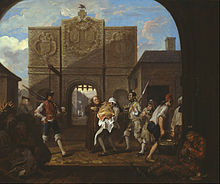Roast beef
Appearance


Roast beef is a dish of beef that is roasted, generally served as the main dish of a meal. In the Anglosphere, roast beef is one of the meats often served at Sunday lunch or dinner. Yorkshire pudding is a standard side dish. Sliced roast beef is also sold as a cold cut, and used as a sandwich filling. Leftover roast beef may be minced and made into hash.
Roast beef is a characteristic national dish of England and holds cultural meaning for the English dating back to the 1731 ballad "The Roast Beef of Old England". The dish is so synonymous with England and its cooking methods from the 18th century that a French nickname for the English is "les Rosbifs".
Quotes
[edit]- We concluded our Walk with a Glass of Burton-Ale, and a Slice of Hung-Beef.
- Joseph Addison, The Spectator, No 383
- "Sir Roger goes to Spring Garden", in The Oxford Book of English Prose (1925)
- On side-tables stand wholesome cold-meats, royal rounds of beef not wanting, with bread thinly sliced and buttered:
- Thomas Carlyle, Frederick the Great (1858–1865)
- "Friedrich Wilhelm's Tobacco Parliament", in The Oxford Book of English Prose (1925)
- When mighty rost Beef was the Englishman’s Food,
It ennobled our Hearts, and enriched our Blood;
Our Soldiers were brave, and our Courtiers were good.
Oh the Rost Beef of Old England,
And Old England’s Rost Beef!Then, Britons, from all nice Dainties refrain,
Which effeminate Italy, France, and Spain;
And mighty Rost Beef shall command on the Main.
Oh the Rost Beef, &c.- Henry Fielding, "The Roast Beef of Old England"
- The Grub-Street Opera (1731); Don Quixote in England (1733)
- Henry Fielding, "The Roast Beef of Old England"
- Roast beef and plum pudding are also held in superstitious veneration,
- Washington Irving, The Sketch Book (1819–1820)
- "Little Britain", in The Oxford Book of English Prose (1925)
- The English men understand almost better than any other people the art of properly roasting a joint, which is also not to be wondered at; because the art of cooking as practised by most English men does not extent much beyond roast beef and plum pudding.
- The Swede Per Kalm, on his visit to England in 1748
- Quoted in: Alan Davidson, The Oxford Companion to Food (1999), p. 68
- When mighty Roast Beef was the Englishman’s Food,
It ennobled our Veins and enriched our Blood,
Our Soldiers were brave and our Courtiers were good.
Oh the Roast Beef of Old England,
And old English Roast Beef.But since we have learn’d from all-conquering France
To eat their Ragouts as well as to dance,
We are fed up with nothing but vain Complaisance.
Oh the Roast Beef, &c.Our Fathers of old were robust, stout, and strong,
And kept open House with good Cheer all Day long,
Which made their plump Tenants rejoice in this song,
Oh the Roast Beef, &c.But now we are dwindled, to what shall I name?
A sneaking poor Race, half begotten—and tame,
Who sully the Honours that once shone in Fame.
Oh the Roast Beef, &c.When good Queen Elizabeth sat on the Throne,
E’er Coffee, or Tea, and such Slip Slops were known,
The World was in Terror, if e’er she did frown.
Oh the Roast Beef, &c.In those Days, if Fleets did presume on the Main,
They seldom, or never return’d back again,
As witness the vaunting Armada of Spain.
Oh the Roast Beef, &c.Oh then they had Stomachs to eat and to fight,
And when Wrongs were a-cooking to do themselves right.
But now we’re a—I cou’d—but good Night.
Oh the Roast Beef of Old England,
And old English Roast Beef.- Richard Leveridge, "A Song in Praise of Old English Roast Beef"
- The British Musical Miscellany, III (1735)
- Variants: st. 2: "all-vapouring" for "all-conquering"; st. 5: "or such" for "and such"; st. 7: "we had" for "they had", "ourselves" for "themselves"
- Richard Leveridge, "A Song in Praise of Old English Roast Beef"
- Give but an Englishman his whore and ease,
Beef and a sea-coal fire, he's yours forever.- Thomas Otway, Venice Preserv'd (1682), act 2, sc. 3
- I am a great eater of beef, and I believe that does harm to my wit.
- William Shakespeare, Twelfth Night (c. 1602), act 1, sc. 3
- Spoken by Sir Andrew Aguecheek
External links
[edit]Most Savage Roasts And Jokes List That Will Shut All Jerks Up

